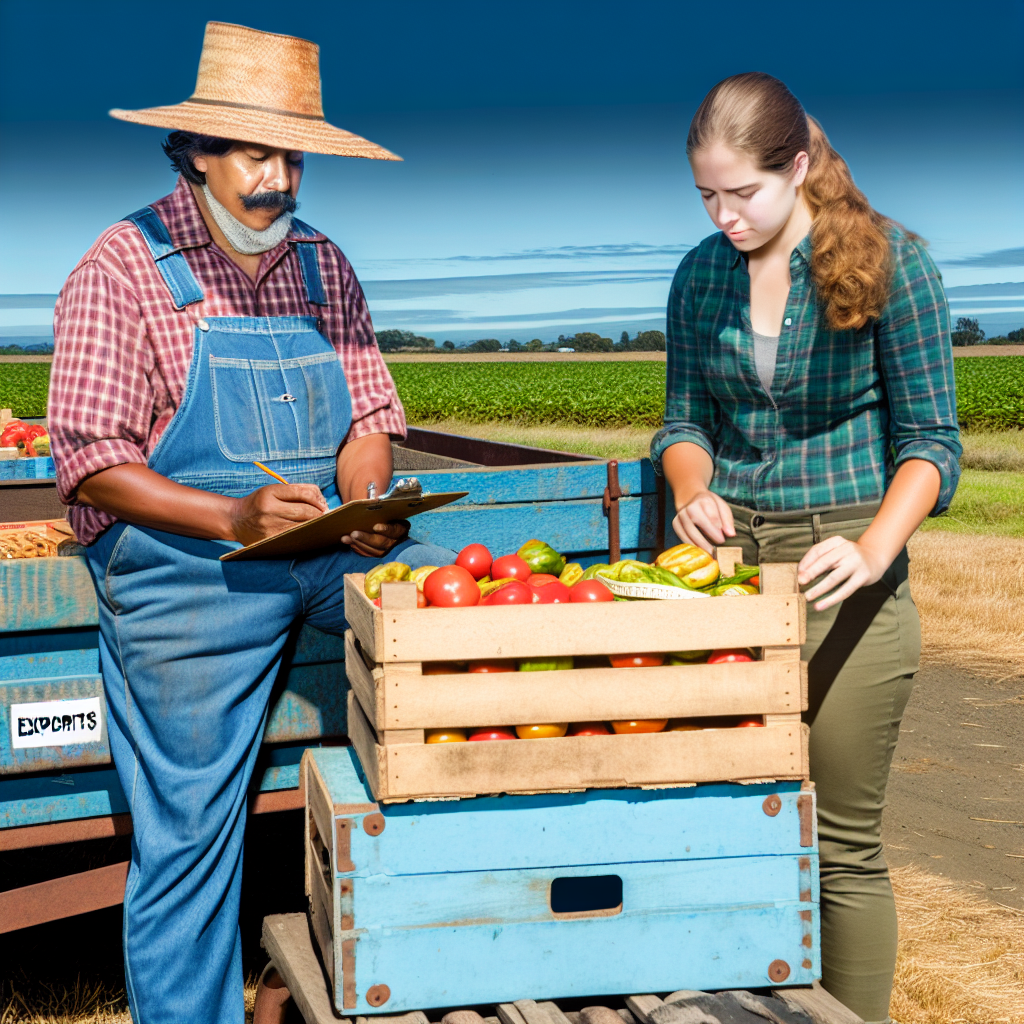Overview of Export Regulations
Understanding the Importance of Export Regulations
Export regulations are crucial for farmers engaging in international trade.
These rules ensure compliance with both domestic and international laws.
They help in safeguarding the quality of exported products.
Moreover, adherence to these regulations enhances market access.
Failure to comply can result in severe penalties and loss of markets.
Key Export Regulations Affecting Farmers
Farmers must understand a variety of regulations that influence exports.
These include phytosanitary measures to ensure product safety.
Additionally, documentation requirements play a pivotal role.
Farmers need to provide certificates of origin and compliance.
Trade agreements can also dictate specific export conditions.
Navigating International Trade Policies
Understanding international trade policies is essential for farmers.
These policies can vary greatly between countries.
Awareness of tariffs and quotas is also critical.
Farmers must monitor changes in trade relationships.
This information can impact pricing and demand for their products.
Transform Your Agribusiness
Unlock your farm's potential with expert advice tailored to your needs. Get actionable steps that drive real results.
Get StartedSupport Resources for Farmers
Numerous resources exist to help farmers navigate export regulations.
Government agencies often provide up-to-date information.
Trade organizations can also offer assistance and training.
Farmers may benefit from consulting experts in international trade.
Furthermore, attending workshops can enhance understanding.
Key Regulatory Bodies Involved in Agricultural Exports
United States Department of Agriculture
The United States Department of Agriculture (USDA) oversees agricultural exports.
USDA provides guidance for farmers to navigate export regulations.
This agency ensures compliance with domestic and international standards.
Moreover, USDA offers resources to improve export efficiency.
U.S. Customs and Border Protection
U.S. Customs and Border Protection (CBP) plays a crucial role in agricultural exports.
CBP monitors goods entering and leaving the United States.
They ensure that exported products adhere to safety and quality standards.
Furthermore, CBP implements tariffs and trade regulations for exporters.
Food and Drug Administration
The Food and Drug Administration (FDA) regulates food safety standards for exports.
FDA protects public health by ensuring food products meet specific guidelines.
This agency conducts inspections and enforces regulations on food quality.
Additionally, FDA provides resources for compliance with international food safety norms.
Animal and Plant Health Inspection Service
The Animal and Plant Health Inspection Service (APHIS) safeguards agriculture through exports.
APHIS manages the health and safety of animals and plants during export.
This agency identifies potential pests and diseases associated with exports.
Moreover, APHIS develops treatment protocols for safe exportation.
State Departments of Agriculture
Each state has its own Department of Agriculture.
These departments assist farmers in understanding local and federal export laws.
State agencies also provide export promotion initiatives in their regions.
Showcase Your Farming Business
Publish your professional farming services profile on our blog for a one-time fee of $200 and reach a dedicated audience of farmers and agribusiness owners.
Publish Your ProfileFurthermore, they facilitate connections between farmers and international buyers.
Export Documentation Requirements
Understanding Documentation Basics
Export documentation is crucial for farmers exporting products.
It ensures compliance with international trade regulations.
Moreover, it facilitates smooth transactions across borders.
Types of Required Documents
Farmers must prepare various documents for exporting goods.
- Commercial Invoice: This details the sale between buyers and sellers.
- Packing List: This outlines the contents of the shipment.
- Bill of Lading: This serves as a receipt from the carrier.
- Certificate of Origin: This verifies where the product was made.
- Phytosanitary Certificate: This confirms products are pest-free.
Process for Document Preparation
Farmers should start early in document preparation.
This allows time to gather all necessary paperwork.
Additionally, they must check the documentation requirements for each destination.
Common Mistakes to Avoid
Incomplete forms can lead to costly delays in shipping.
Farmers should ensure accuracy in all provided information.
Furthermore, missing deadlines for documentation submission can cause substantial issues.
Resources for Assistance
Various resources can help farmers with export documentation.
- Local agricultural extension offices offer guidance.
- Trade associations provide valuable information and support.
- Online platforms facilitate document creation and compliance checks.
Discover More: Leveraging Tax Incentives for Farm Expansion
Standards for Quality and Safety in Agricultural Exports
Importance of Quality Standards
Quality standards play a crucial role in agricultural exports.
They ensure that products meet specific criteria for safety and quality.
Moreover, they increase buyer confidence in the products.
Compliance with these standards can enhance market access.
Farmers benefit from improved pricing and increased demand.
Global Safety Regulations
Governments worldwide enforce safety regulations in agricultural exports.
The Food and Drug Administration (FDA) and the USDA oversee U.S. regulations.
In Europe, the European Food Safety Authority (EFSA) sets stringent guidelines.
These organizations monitor pesticide residues and foodborne pathogens.
Thus, understanding these regulations is essential for exporters.
Labeling Requirements
Proper labeling is vital for agricultural products.
Labels must clearly indicate the product’s origins and contents.
This transparency helps consumers make informed choices.
Additionally, labeling must comply with each importing country’s regulations.
Non-compliance can lead to shipments being rejected or delayed.
Documentation and Traceability
Documentation is crucial for successful agricultural exports.
Exporters must maintain detailed records for each shipment.
These records assist in tracing products through the supply chain.
Traceability enhances food safety and recalls if necessary.
Importers often request these documents to ensure compliance.
Quality Assurance Programs
Implementing quality assurance programs is beneficial for farmers.
These programs help maintain consistent product quality.
They can include Hazard Analysis and Critical Control Points (HACCP) systems.
Additionally, certification bodies often verify these programs.
Certified products can gain a competitive edge in the market.
Pesticide and Chemical Use Regulations
Exporters must understand regulations regarding pesticide use.
Countries have established maximum residue limits (MRLs) for chemicals.
Showcase Your Farming Business
Publish your professional farming services profile on our blog for a one-time fee of $200 and reach a dedicated audience of farmers and agribusiness owners.
Publish Your ProfileCompliance with these limits is crucial for successful exports.
Farmers should educate themselves on permissible pesticide use.
Testing for residues may be required before shipment.
International Trade Agreements
International trade agreements influence agricultural exports.
Agreements can reduce tariffs and trade barriers.
Farmers must be aware of agreements affecting their products.
Effective trade agreements can open new markets for exports.
Staying informed about these agreements is essential for success.
Discover More: Simplifying Tax Compliance for Farmers
Tariffs and Trade Agreements Affecting Farmers’ Exports
Introduction to Tariffs
Tariffs are taxes imposed on imported goods.
They directly impact the profitability of farmers’ exports.
Increased tariffs can reduce demand for exported agricultural products.
Farmers must stay informed about current tariff rates.
Understanding Trade Agreements
Trade agreements are treaties between countries to facilitate trade.
These agreements can lower or eliminate tariffs on agricultural products.
Farmers benefit from favorable trade agreements that expand market access.
For example, agreements like USMCA impact North American farmers significantly.
Key Trade Agreements Impacting Farmers
Several major trade agreements shape the agricultural export landscape.
NAFTA, now USMCA, is a pivotal agreement for North American trade.
The Trans-Pacific Partnership (TPP) aimed to increase trade with Pacific nations.
Similarly, the EU has numerous agreements affecting global agricultural exports.
Effects of Tariffs on Crop Prices
Tariffs can lead to increased prices for exported crops.
Higher prices can make U.S. products less competitive internationally.
Farmers need to evaluate market conditions regularly.
Changes in tariffs often trigger fluctuations in crop prices.
The Role of Export Subsidies
Export subsidies assist farmers by reducing the cost of exports.
These financial incentives can enhance export competitiveness.
However, subsidies can lead to trade disputes with other nations.
Understanding these dynamics helps farmers make informed decisions.
Monitoring Trade Policies
Farmers should routinely monitor changes in trade policies.
Policy updates can influence export landscapes rapidly.
Engaging with agricultural organizations provides valuable insights.
Staying connected with trade experts enhances a farmer’s strategic planning.
Impact of International Relations
International relations significantly affect trade agreements and tariffs.
Political tensions can lead to sudden tariff changes.
Farmers must remain vigilant about geopolitical developments.
Such knowledge is crucial for anticipating market shifts.
Discover More: Family Labor Laws on Farms

Labeling Requirements for Exporting Agricultural Products
Importance of Proper Labeling
Proper labeling enhances product visibility in international markets.
It ensures compliance with different countries’ regulations.
Showcase Your Farming Business
Publish your professional farming services profile on our blog for a one-time fee of $200 and reach a dedicated audience of farmers and agribusiness owners.
Publish Your ProfileMoreover, clear labels foster consumer trust and brand reputation.
Understanding Label Components
Each label must include essential information about the product.
Include the product name, weight, and country of origin.
Additionally, specify any certifications such as organic or fair trade.
List the ingredients as well, especially for processed goods.
Language and Format Requirements
Labels must be written in the official language of the destination country.
Use legible fonts and appropriate sizes for visibility.
Furthermore, follow local formatting guidelines closely.
Compliance with International Standards
Adhering to international labeling standards is crucial.
Organizations like Codex Alimentarius provide guidelines.
These standards uphold food safety and quality internationally.
Common Mistakes to Avoid
- Neglecting to update labels when regulations change.
- Using terms or symbols that are misleading.
- Failing to account for all required label elements.
Avoid these pitfalls to ensure better compliance and market acceptance.
Resources for Farmers
Farmers can access various resources for labeling assistance.
Organizations like the USDA offer guidance and support.
Additionally, industry associations can provide valuable insights.
Utilizing these resources will help maintain compliance and improve sales.
Gain More Insights: Export Market Access for Farmers
Customs Procedures and Compliance for Farmers
Understanding Customs Regulations
Farmers must adhere to specific customs regulations when exporting goods.
These regulations vary by country and product type.
Compliance is crucial to avoid fines and delays.
Navigating Export Documentation
Proper documentation is essential for successful exports.
Farmers need to prepare invoices, packing lists, and certificates of origin.
Additionally, export permits may be necessary depending on the product.
Accurate records expedite the customs clearance process.
Preparing Products for Export
Quality control plays a vital role in export readiness.
Farmers should ensure products meet international standards.
Packaging must be durable and suitable for transportation.
Certain products may require specific labeling or certifications.
Customs Duties and Tariffs
Understanding customs duties helps manage export costs.
Farmers need to research applicable tariffs for their products.
Tariffs may influence pricing and market competitiveness.
Working with Customs Brokers
Hiring a customs broker can streamline the export process.
Broadened expertise reduces the risk of compliance issues.
These professionals can manage documentation and logistics efficiently.
Staying Updated on Regulations
Farmers must stay informed about changing regulations.
Government websites and industry associations provide updates.
Networking with other exporters can offer valuable insights.
Impact of International Trade Policies on Local Agriculture
Understanding Trade Regulations
International trade policies significantly affect local farming practices.
Regulations can impose restrictions on what farmers can export.
Compliance with these rules is essential for market access.
Showcase Your Farming Business
Publish your professional farming services profile on our blog for a one-time fee of $200 and reach a dedicated audience of farmers and agribusiness owners.
Publish Your ProfileEffects on Crop Selection
Trade agreements can influence crop selection for farmers.
Farmers may choose to grow cash crops to meet market demands.
However, this might limit local food production.
Market Competition
International trade increases competition for local farmers.
Farmers must adapt to compete with foreign producers.
This competition may pressure them to innovate.
Economic Implications
Trade policies directly affect farmers’ income levels.
Reduced tariffs can increase profits for exported goods.
Conversely, unfavorable terms can lead to financial strain.
Access to Resources
Trade agreements can also impact resource availability.
Farmers may face restrictions on the import of necessary supplies.
This can affect operations and overall productivity.
Government Support Programs
National policies may offer support to mitigate trade impacts.
Subsidies can help local farmers compete in global markets.
Such programs are crucial for ensuring agricultural sustainability.
Environmental Considerations
Trade regulations can promote environmentally friendly practices.
They might encourage farmers to adopt sustainable techniques.
This can enhance biodiversity and soil health in local areas.
Future Outlook
Ongoing negotiations can redefine trade dynamics for agriculture.
Farmers must stay informed about policy changes.
Adapting to these changes is crucial for long-term success.




